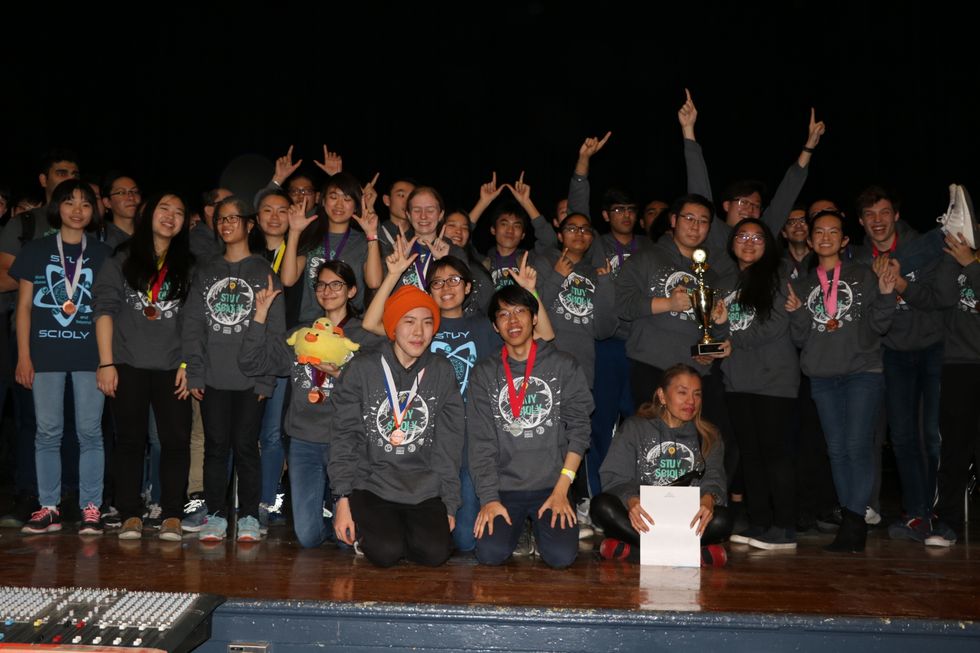Throughout high school, I've always been in love with science. Science always excited me in all my classes, so I decided to join Science Olympiad at Stuyvesant High School.
My school organizes Science Olympiad very differently than other schools in that teachers are much less involved than the students. This dynamic approach is what lets experienced students lead the many events that compose Science Olympiad. However, it was so popular when I entered high school that we had to take a "tryout test" to even sit for lessons and be considered for the team. I studied as hard as I could, and I somehow passed and managed to sit for lessons.
As my focus is primarily biology-oriented, I joined the Biology Division and participated in three events: Anatomy and Physiology, Cell Biology, and Entomology. I wanted to be able to compete in these three events to represent my high school at the New York City Regional competition. However, in order to compete for the team, each event leader gives students a "mock trial," which is basically a mock test that simulates the difficulty of a Regional-level test. The students who perform highest on that mock trial are selected to compete at Regionals on one of three teams Stuyvesant sends: A, B, and C.
I absolutely bombed all three mock trials and wasn't able to compete at Regionals, which discouraged me. However, I realized that I was just a freshman and that many freshmen, in general, don't have the knowledge or experience to compete at Regionals. I mustered up the determination to perform better as a sophomore.
Entering sophomore year, I studied harder after school to perform well on the mock trials, and my hard work paid off. I competed in Anatomy and Physiology, Cell Biology, and Disease Detectives. I ended up acing every mock trial (except for Disease Detectives) and was selected to compete in Regionals on team B! At Regionals, I did place high, and Stuyvesant came second in New York City! After Regionals, I applied to become a captain and eventually became the biology captain as a junior.
To be honest, I mainly wanted to be a captain because I could teach Anatomy and Physiology. Given that I wanted to be a doctor, this subject was by far my most favorite of all the sciences. In this event, students are tested on their knowledge of three body systems, and this year I taught the nervous system, the sensory organs, and the endocrine system.
Teaching this event was one of the reasons I loved Stuyvesant and wanted to come to school every day. I prepared my lessons the summer before and enthusiastically taught them to my audience. I couldn't stop pouring out my intense love and passion for the subject.
This garnered huge results when I gave my own mock trials. I designed them to be as difficult as state-level exams. After I administered the exam, I selected not just the people who did well but also people who showed a high level of commitment. My thought process was that some people are only going to come to the mock trials and not to any of my lessons, and I wanted to reward the students who did come because they would easily study hard before Regionals to perform well.
I think my lessons did a good job of preparing my students because every team placed high for Anatomy and Physiology. Stuyvesant placed third in the city, but we were still invited to the New York State Science Olympiad competition. We placed 10th there, which was a huge jump from last year (22nd!)
As a senior, I maintained my position as biology captain and taught Anatomy and Physiology as well as a new event called Microbe Mission. I taught the digestive system, respiratory system, and immune system, as well as general microbiology. These were my two biggest events, and I refined my teaching style from last year such that more people understood my lessons and internalized them.
I even tried to come up with new phrases to describe certain diseases. I made my mock trials much more comprehensive to better reflect States. Ultimately, this led to better results, and because the whole team worked together, we placed first in Regionals for the first time in four years and sixth at States, the highest we've ever placed in Stuyvesant's 100-year history.
What do I take from Science Olympiad?
It was here that I learned how to be a leader and help people learn. Being a captain helped me talk to different types of people and understand how they think, and it certainly helped me be a more effective communicator. I also learned that I'm extremely passionate about teaching, and my teaching kept me on my toes with time management because I had to balance a heavy course load with making lessons for my students.
I'm thankful to Stuyvesant because of the amazing experience I've received for four years! I'm honestly proud to step down as captain because I'm proud that I helped leave behind a legacy at Stuyvesant High School.
















